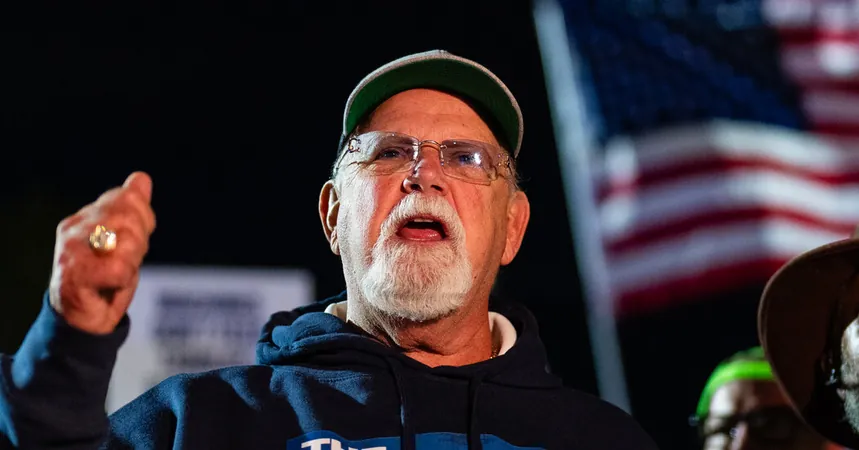
Union Showdown: The Battle for Better Wages at the Ports
2024-10-03
Author: Ying
Union Showdown: The Battle for Better Wages at the Ports
In a striking turn of events, Harold J. Daggett, the president of the International Longshoremen’s Association (ILA), is spearheading a massive strike that has brought port operations throughout the East and Gulf Coasts to a standstill. Nearly 47,000 union members, whose vital work involves moving cargo on and off ships, are demanding substantially higher wages, improved benefits, and limitations on the introduction of labor-saving technologies.
Daggett, now 78, is no stranger to controversy. Nearly two decades ago, he faced serious allegations of mob involvement in union affairs but emerged victorious after a trial that acquitted him of all charges. His tenure as president, which has lasted 13 years, has been marked by significant challenges—and the current strike is framed as a battle against large multinational corporations that significantly profited during the pandemic-induced supply chain disruptions.
"We're going to win this thing,” Daggett declared with passion as his members rallied outside a New Jersey port terminal. His assertion that businesses cannot withstand prolonged disruptions underscores the leverage that his union holds in this confrontation. Labor experts like William Brucher emphasize that the strike's economic implications could be substantial: “If they stop working, the goods stop moving.”
However, Daggett’s leadership style has not been without criticism. Some union members describe him as autocratic, and there’s an ongoing concern about the ILA’s struggles to keep pace with benefits and wages offered by their West Coast counterparts, the International Longshore and Warehouse Union (ILWU). While Daggett’s generous salary—totaling over $900,000 last year—highlights the financial dynamics within the union, many members feel that improvements to retirement benefits have not been prioritized.
In historical context, the ILA’s structure is notably different from the more democratic approach taken by the ILWU. While the leaders of the ILWU often cultivate a supportive environment, ILA members report feeling sidelined in decision-making processes, leading to dissent regarding strike authorization and other key initiatives.
Daggett seeks to negotiate a substantial 61.5 percent pay raise over six years, pushing the top hourly wage to over $64. Meanwhile, port employers, represented by the United States Maritime Alliance, have countered with an offer of nearly 50 percent over the same timeframe. The stakes for both parties are high, considering how essential the ports are to the economy, particularly as they serve automakers, retailers, and more.
Alongside financial demands, the issue of job security looms large, with Daggett vowing to protect against increased automation that could jeopardize workers’ roles. Despite his strong statements, details regarding how to prevent automation from encroaching upon port jobs remain elusive.
Additionally, the specter of organized crime continues to cast a long shadow over the ILA. The union has faced scrutiny since 1949 when investigations uncovered mob influence within its ranks. While efforts to eradicate such connections were made with the establishment of the Waterfront Commission, recent moves to dissolve this oversight have led to renewed concerns among union members and labor historians.
In these turbulent times, the actions of Daggett and the ILA will be pivotal in shaping the future of labor relations at one of America’s busiest ports—a struggle that might define the next chapter of union activism in the U.S. as they grapple with the twin challenges of fair compensation and maintaining job security in an increasingly automated world.
As the strike continues, the eyes of the nation will remain fixed on the outcome, with both parties aware that the resolution could set a precedent for labor movements across the country. Will Daggett’s gambit pay off, or will the union face a prolonged battle for survival? Only time will tell.




 Brasil (PT)
Brasil (PT)
 Canada (EN)
Canada (EN)
 Chile (ES)
Chile (ES)
 España (ES)
España (ES)
 France (FR)
France (FR)
 Hong Kong (EN)
Hong Kong (EN)
 Italia (IT)
Italia (IT)
 日本 (JA)
日本 (JA)
 Magyarország (HU)
Magyarország (HU)
 Norge (NO)
Norge (NO)
 Polska (PL)
Polska (PL)
 Schweiz (DE)
Schweiz (DE)
 Singapore (EN)
Singapore (EN)
 Sverige (SV)
Sverige (SV)
 Suomi (FI)
Suomi (FI)
 Türkiye (TR)
Türkiye (TR)